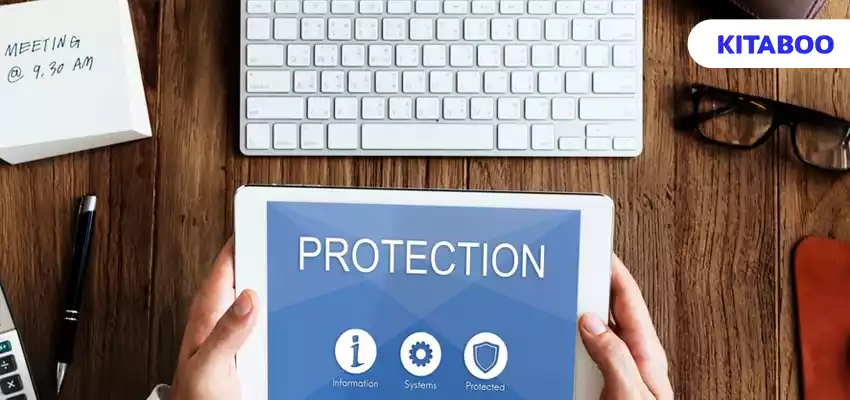
Copy Protection for eBooks: Safeguard Your Work and Earn Your Worth!
Writing a book requires a lot of work, right from generating a unique idea, structuring it into chapters, to capturing the reader’s attention. Books are rightly described as a labor of love that requires the author’s passion for storytelling and continued discipline, dedication, and perseverance.
Therefore, authors may pay attention to copyrights when publishing their books. This becomes all the more important for eBooks. In this digitally advanced world, copy protection for eBooks is necessary for authors to safeguard their work and ensure no one can misuse it.
If you also have concerns about eBook piracy and want to learn more about safeguarding your eBooks, you’re at the right place.
This article will discuss why and how you should protect your eBooks.
Table of Contents
I. Why Is Copy Protection for eBooks Important?
Why Is Copy Protection for eBooks Important?
Mentioned here are some reasons why copy protection for eBooks is essential, each of them underscoring the importance of protecting authors’ rights and preserving the integrity of the work in the digital landscape:
Intellectual Property Rights
Authors invest a lot of time, energy, and effort into writing and presenting an original book to readers. Consequently, intellectual property rights prevent others from unlawfully claiming the work as their own without permission.
Intellectual property rights help authors and creators maintain control over their intellectual property, preventing unauthorized copying, distribution, and exploitation of their works.
Author's Revenue
Many writers pursue writing not only as a hobby but as a full-time job and a source of income. eBook piracy can significantly undermine the writer’s chances of receiving just compensation for their intellectual property. Copy protection ensures that writers are fairly compensated for their work and helps safeguard their sources of revenue.
Content Integrity
Copyright not only helps to protect eBooks from being copied but also preserves the integrity of the work by preventing unauthorized alterations, modifications, or adaptations. By safeguarding the original content, authors can ensure that their works are presented to readers as intended, without unauthorized changes or distortions.
Copyright Laws
Copy protection is also essential for upholding the author’s intellectual property rights. With copyright laws in place, authors can take legal action against those who infringe their copyright laws by copying, distributing, or adapting the work without legal permission.
Piracy
The digital publishing ecosystem loses a lot of revenue and sales due to piracy. Along with the publishers, the author’s reputation is also tarnished due to piracy and unauthorized use of the content. eBook piracy is a global issue, with the US being at the forefront of pirated eBook consumers worldwide.
As a result, American publishers lose $300 million yearly to piracy. Measures like copy protection and digital rights management significantly help deter piracy and protect the rights of authors and publishers.
Standard Measures for eBook Protection
Authors and publishers can implement some standard measures while publishing and distributing the eBook to eliminate unauthorized copying. Some of these standard measures are:
Digital Rights Management (DRM)
Authors and publishers use Digital Rights Management technology to control access to copyrighted content. With DRM protocols, unauthorized access, distribution, and modification of content can be prevented.
DRM solutions limit users and devices by encrypting eBook files. Digital publishing platforms like KITABOO also utilize DRM technology to prevent illegal copying. Some other popular DRM technologies are Apple’s FairPlay, Amazon’s Kindle DRM, and Adobe Digital Editions.
Watermarking
Watermarking refers to attaching a logo or text on a document or image file for copyright protection. It protects the eBook’s copyright and ensures that it can not be reused or modified without permission.
Watermarks generally include information such as the purchaser’s name, transaction details, or a unique identifier, allowing authors to trace leaked copies back to their source.
Encryption
Encryption refers to the mathematical process of scrambling the eBook’s contents when an unauthorized audience accesses it. Technically, it is defined as converting human-readable plaintext to incomprehensible text, also known as ciphertext.
Often, publishers utilize this method to prevent illegal access and copying of the eBook. However, it is also important to note that although encryption offers a high degree of protection, it can also cause compatibility problems and inconvenience for authorized users who do not have the decryption keys.
Digital Signatures
Digital signatures can be understood as a digital equivalent of handwritten signatures. Just like handwritten signatures provide evidence of identity on paper documents, digital signatures can also provide evidence of ownership, identity, and origin of eBooks and other electronic documents.
Digital publishing platforms also utilize private key technology to create digital signatures and add them to the eBooks.
Geo-Blocking
This copy protection measure for eBooks adds access restrictions based on the reader’s geographical location. This method uses IP address filtering technology to determine the location of the readers and grant access accordingly.
Digital publishing platforms often use this measure to adhere to regional copyright laws and prevent unauthorized distribution in specific locations. However, geo-blocking may also inconvenience legitimate users, particularly those traveling or residing in regions with restricted access.
Safe Distribution Platforms
Authors must onboard reliable distribution platforms to publish and distribute their eBooks safely. Reliable platforms like KITABOO effectively incorporate copyright protection measures like DRM for eBooks, encryption, and secure payment portals to safeguard the author’s intellectual property.
By hosting eBooks on secure distribution platforms, authors can minimize the risks of unauthorized copying and distribution while providing users with a convenient and reliable way to buy and access their works.
Conclusion
Authors and distributors must implement reliable protection measures to achieve the right balance between security and accessibility. Ultimately, copyright protection is essential to digital publishing, allowing writers to tell their stories to a global audience while preserving their rights.
However, while authors and publishers are doing their part, it is also essential for readers to support ethical reading practices and ensure each author is fairly compensated for their hard work.
Digital publishing platforms and providers like KITABOO are leveraging advanced copyright measures and technologies to publish, distribute, market, and amplify eBooks to a global audience ethically and securely.
Connect with KITABOO to start a conversation.
Also check:
- Digital Textbook Platform for K12 Publishers
- Digital Textbook Platform for Associations & Societies
- Digital Textbook Platform for Trade Publishers
- Digital Textbook Platform for Training Companies
- Digital Publishing Solution for Content Aggregators
- Digital Publishing Platform for Professional Training
Discover how a mobile-first training platform can help your organization.
KITABOO is a cloud-based platform to create, deliver & track mobile-first interactive training content.



